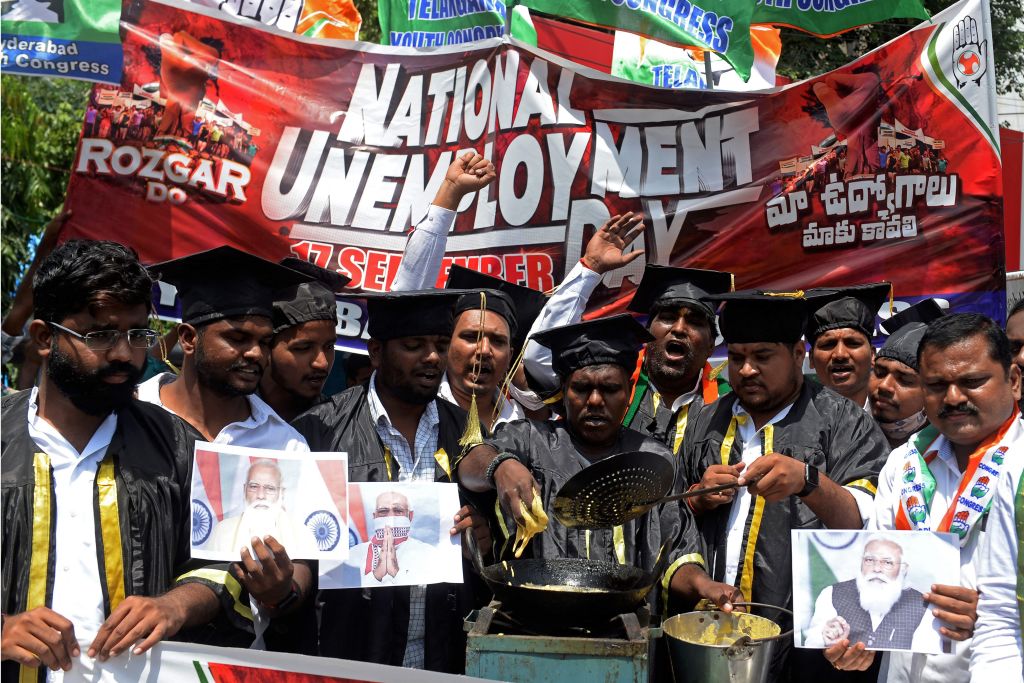- Friday, April 19, 2024

By: Shubham Ghosh
UNDER prime minister Narendra Modi, the Indian government has been claiming big reforms but when it comes to employment, the scenario is far from satisfactory and the current pandemic is not the only factor to be blamed.
BBC recently cited the story of Jitendra Maurya, a law graduate in India who was among more than 10,000 jobless young people who gave interviews for 15 low-skilled government jobs in the central Indian state of Madhya Pradesh.
Many of the applicants were over-qualified, including post-graduates, engineers, MBAs and others, the BBC cited one report. Maurya himself is preparing for a judge’s examination but is desperately in need for a job.
“The situation is such that sometimes there is no money to buy books. So I thought I will get some work [here],” Maurya told a news network.
India, Asia’s third-largest economy, has been hit hard by the pandemic. Pent-up demand and raised government spending have seen the economy on a rebound but jobs are witnessing a diminishing rate.
In December, the country’s unemployment rate went up to almost eight percent, according to the Centre for Monitoring Indian Economy (CMIE), an independent think tank based in Mumbai in the western state of Maharashtra. The rate was over seven per cent in 2020 and for most part of 2021.
“This is way higher than anything seen in India, at least over the last three decades, including the big [economic] crisis of 1991 [when the country did not have enough dollars to pay for imports],” Kaushik Basu, former chief economist of the World Bank and chief economic adviser to the Indian government, told BBC.
He said while joblessness in most countries went up in 2020, India’s rate exceeded most emerging economies, including neighbour Bangladesh (5.3 per cent), Mexico (4.7 per cent) and Vietnam (2.3 per cent).
According to the CMIE, salaried jobs have shrunk as well. One possible reason is the firms using the pandemic to cut down their workforce and reduce costs. Studies conducted by Bengaluru-based Azim Premji University showed young workers, aged between 15 and 23, were the hardest hit during the lockdown in 2020.
“There was a churn. We found that about half of those who had salaried work before the lockdown could not retain such work,” Amit Basole, an economist at the university, was quoted as saying by the BBC.
But the pandemic is only partially responsible for the sharp loss in jobs, according to economists.
Basu told BBC that the scenario in India reflects the fact that policy in the country is made with little attention to the well-being of workers and small businesses, which he said was seen during the 2020 lockdown.
While the number of active job seekers in the working-age population has gone down and the proportion of women, aged 15 and above, in the workforce is among the lowest in the world, unemployment continues to be a major challenge for India.
Unemployment in the country mainly refers to educated young people looking for jobs in the formal economy, even though the informal economy employs an overwhelming 90 per cent of the workforce and generates 50 per cent of the economic output.
“Unemployment is a luxury which the educated, relatively well-off can afford. Not the poor, unskilled or semi-skilled people,” Radhicka Kapoor, a labour economist, told BBC.
One reason behind India’s economic unemployment despite the high growth, according to the BBC report, is its leapfrogging from a primarily farm economy to a booming services economy. Since the country’s growth has been powered by high-end services such as software and finance manned by highly skilled workers, there have been few manufacturing or factory jobs that can absorb a large unskilled or low-skilled work force.
Basu said India’s joblessness is a worry because despite the nation’s growth restarting, the bottom segment is doing worse than in most other countries. He feels the government needs to control inflation, create employment and support workers. Besides, a “politics of polarisation and hate” during Modi’s rule is “damaging trust, which is one of the most important underlying drivers of economic development”, the report added.
In the short term, experts like Dr Basole feel India urgently requires cash transfers or an employment-guarantee scheme for the bottom 20 per cent of its struggling households in cities to help them consume and pay back debt. In the long run, the challenge is to ensure that all workers get a basic minimum wage and social security.
Until then, India cannot have any meaningful reforms in jobs, Kapoor said.
![]()